Now, let me give you some background: I’ve quite literally been a lifelong Trekkie. My relationship with this franchise began very early in the 1970s, watching The Original Series in syndication on Channel 56 in Boston, Massachusetts. My first grade teacher and I bonded instantly over the fact that we were both fans of the show, so we would discuss the previous evening’s episode each day before class. As a child, I built (and later broke through vigorous play) multiple AMT USS Enterprise and Exploration Set model kits. I had all the Mego figures and the vinyl Bridge playset (with the spinning transporter chamber) to go with them. A copy of the Starfleet Technical Manual sits on my bookshelf to this day.
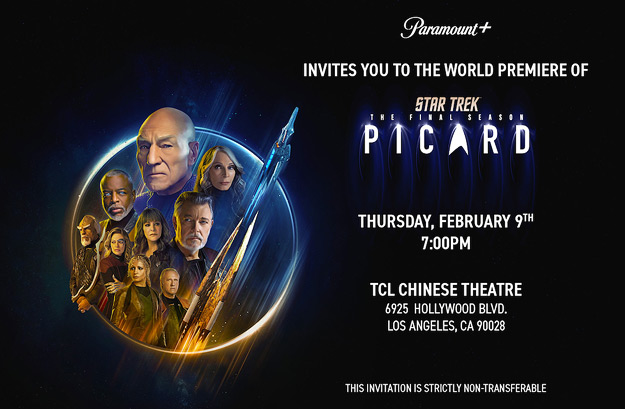
My love of this franchise only grew as the years progressed. I saw Star Trek: The Motion Picture the day it opened in my local theater in 1979. I took my first date in high school to see Star Trek II. One of the first gifts my future wife ever gave me—years before we married—was a video release poster for The Original Series signed by Gene Roddenberry. The Next Generation was must-see TV all throughout my college years (I will admit to owning a screen-used combadge worn by Brent Spiner). And though I watched Deep Space Nine and Voyager a bit less frequently, as I entered the workforce after graduation, it pained me when the under-appreciated Star Trek: Enterprise was cancelled after only four seasons.
When the Berman era ended, I saw Star Trek (2009) with several of my fellow film industry Treksperts (including some Inglorious ones), and I will confess that I liked it more than most. I still have a fondness for Star Trek Into Darkness, though the film hasn’t aged well for me. But by the time Star Trek Beyond arrived—a film I saw at the Comic-Con world premiere screening—I’d grown weary of the direction Star Trek had taken under JJ Abrams and company. (And I confess that being directly involved in the whole CBS v Axanar kerfuffle certainly didn’t help.)

Though I’ve taken pains to keep an open mind, Discovery made my brain bleed, filled as it is with emotionally unstable characters that couldn’t pass a Starfleet psych exam much less get assigned to starship duty, most of them paralyzed by childhood trauma. And the first two seasons of Picard were painful, a mix of poignant moments and graphic violence, connected by recycled plots, and wrapped in wildly unnecessary retcons of the Trek canon. Far from optimistic and hopeful, its vision of the future was dreary, chaotic, and at times downright gruesome—a world that few of us would ever aspire to live in. It was, in a word, dreadful. But Strange New Worlds has shown real improvement. Frankly, it feels like what I expected more of after the 2009 film. Anson Mount, Rebecca Romijn, and Ethan Peck are terrific, and adding Babs Olusanmokun to the cast (from Dune) was a coup. The show is glossy, but it works. God help me, I like it.
All of this is a long-winded way of sharing my Trekkie bona fides with you. And I hope that it will help you to calibrate your reaction to what I’m about to say now…
The third season of Picard is the kind of Star Trek I never thought I’d see again.
It’s the real deal—authentic, gripping, and deeply heartening. It respects the history of this franchise without simply feeling like an exercise in nostalgia. It’s been hand-crafted by people who love and understand classic Star Trek as well as anyone—people who have honored that legacy even as they’ve refreshed it for today’s serialized storytelling format.
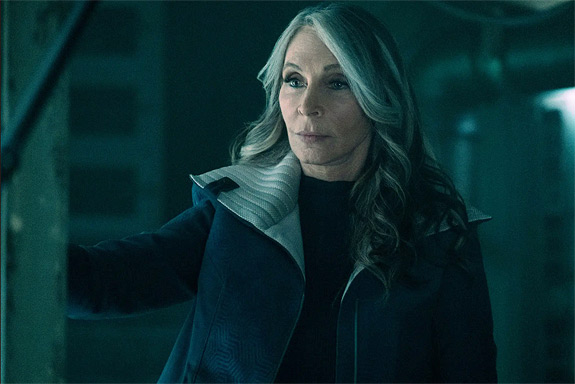
Here’s a brief spoiler-free setup: Admiral Jean-Luc Picard (Patrick Stewart) is preparing for his retirement, upon which he means to sip Saurian brandy and work on his memoir, when he receives a distress call on his old Enterprise-D combadge from Beverly Crusher (Gates McFadden). She’s clearly in trouble and needs help, but warns Picard to trust no one. So the admiral turns to his old friend Will Riker (Jonathan Frakes), who decodes the coordinates within the message that reveal Crusher’s location. To get there, they’ll need to commandeer a ship without alerting Starfleet, and Riker’s got a plan: They’ll visit his old starship, the USS Titan—now commanded by Captain Liam Shaw (actor Todd Stashwick, who’s delightful in the role)—under the guise of an inspection. And with the help of another old friend (the ship’s first officer), they hope to change its course. So Picard and Riker set off like Butch and Sundance to save Crusher, possibly at the cost of their own careers. But what they uncover in the process is a threat far greater than anything they imagined—a danger so grave that it will unite friends old and new for one final mission to save the Federation.
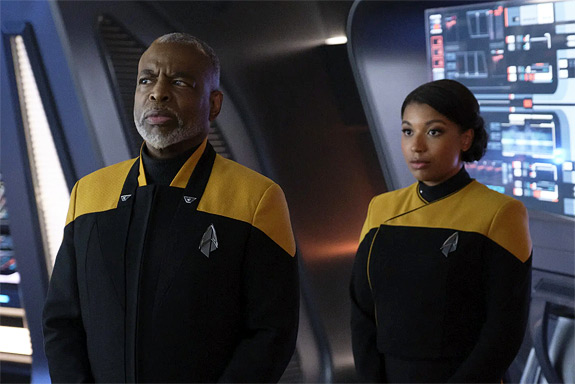
Season Three of Picard is wildly cinematic. It’s almost as if we’ve been given five more Next Generation feature films rather than a single ten-episode TV season. The production value is high indeed, but never feels as glossy or excessive as it does on other recent Trek series. The cast is fantastic—not just your Next Generation favorites (who all return here), but the newcomers too. Yet the crew of the Enterprise-D have changed a great deal since you’ve last seen them, and watching how they fall back into their old roles—in new and unexpected ways—is half the pleasure. The writing is smart, efficient, and note-perfect, yet age and experience means these characters aren’t afraid to say things to each other than they never would have in the past. The action is gripping and dynamically staged. And the plot twists are surprising and—most importantly—well-earned when they happen.
But what’s most surprising about this season is the simple feeling of “Oh my god, this is Star Trek!” I’m talking about the real McCoy here, not the pale imitation we’ve been getting for years now. The shock of that realization is so strong that you don’t trust it at first. But as the minutes pass, everything is exactly right. Starfleet is depicted as a professional organization once again! The vibe is as it should be, the technical details are spot on. And the score—I can’t wait to own the soundtrack for this season! It’s filled with little theme quotes and cues from the entire history of this franchise. All too soon, you realize that you’ve just watched multiple episodes and that joy of recognition simply never goes away. And it’s overwhelming! At the end of one of these episodes, I actually found myself welling up in tears. A couple of friends (who’ve seen the entire season) warned me that it would happen, and when it did, it was just… well, it was wonderful. Longtime fans will understand what I mean: You know real Star Trek when you see it. And I’m here to tell you, from the very first seconds to the very last… this is it.
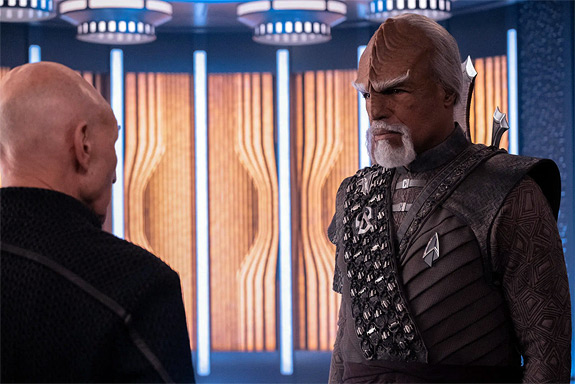
If I had any reservations here, it’s that I’m afraid the current Star Trek overlords will dismiss the overwhelmingly positive reaction that longtime fans are going to have to this season as a simple exercise in nostalgia. Nostalgia plays a role to be sure, but the most important thing here is the authenticity—the care and attention to detail that’s so obvious in every frame. Picard: Season Three feels familiar and fresh all at once. It’s proof that TV Star Trek can be great again, and it points the way to making that happen. I truly hope that Alex Kurtzman, his team at Secret Hideout, and the decision makers at Paramount+ actually recognize this and take the right message from it.
But that’s a concern for another day. For now, the bottom line is this:
If you’re a lifelong Trek fan... Star Trek: Picard – Season Three is a gift. It’s easily the best Star Trek in at least two decades.
What’s more, if the final four episodes are as good as the first six, it has the potential to be regarded as one of the best seasons of this franchise ever. And I’m truly grateful for it.
As it happens, I got the chance to briefly meet Terry Matalas after the screening last week (thanks to my old friend Robert Meyer Burnett) and I suspect I sounded like a complete moron when talking to him, still recovering as I was from the experience of seeing those first two episodes. So Terry, if by chance you read this: Thank you.
You’ve accomplished something that I thought was impossible. To paraphrase Kirk and Azetbur from The Undiscovered Country, you’ve restored my faith.
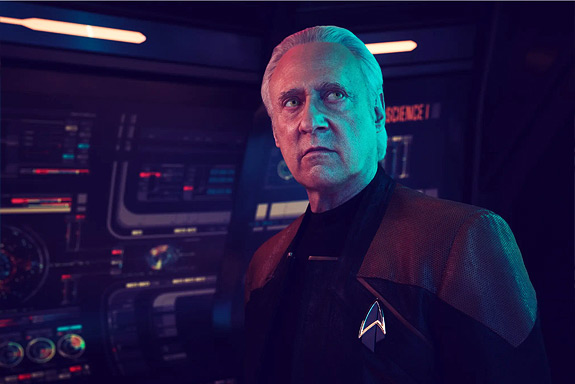
The third and final season of Star Trek: Picard debuts on Paramount+ tomorrow, and it’s well worth the price of admission. Don’t miss it.
(You can follow Bill on social media at these links: Twitter and Facebook)






